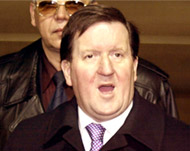New NATO chief faces key tests
Former Dutch foreign minister Jaap de Hoop Scheffer takes over as NATO head on Monday at a crucial time for the alliance, facing key tests in Afghanistan and Iraq.

De Hoop Scheffer succeeds straight-talking Scotsman George Robertson as secretary general of the North Atlantic Treaty Organisation (NATO). He is the third Dutchman to lead the alliance during its 55-year history.
Scheffer will have his work cut out: the 19-member alliance was plunged into its deepest crisis ever by last year’s Iraq war.
But it is far from the only challenge for NATO, the West’s former Cold War fighting bloc which is battling to transform itself into a relevant force in the post 9/11 world.
A key mission is in Afghanistan, where last year NATO took
charge of a mission beyond Europe for the first time in its history, at the helm of the International Security Assistance Force (ISAF).
But the Alliance, which depends on its member states for
military hardware, has struggled to drum up the resources needed for the mission – a problem made more acute by a decision to expand ISAF beyond Kabul this year.
And Iraq will likely test de Hoop Scheffer’s diplomatic skills
to the full.
|
“A European foreign policy that stood apart from the United States would be against the interests of the European Union” De Hoop Scheffer, |
Last February, NATO was plunged into what one senior diplomat called a “near-death experience” when three of its members opposed to the Iraq war – France, Germany and Belgium – refused to approve alliance help for Turkey.
NATO officials say that the deep wounds from that conflict have healed, pointing to the alliance’s decision to help Poland establish its command of a US-led multi-national force in Iraq.
Another key diplomatic challenge for the Dutchman is cooperation with the European Union. The United States has notably been concerned in recent months at EU plans for its own defence planning capacity.
In this regard, the EU’s planned takeover of command of a
NATO-led peacekeeping mission in Bosnia-Hercegovina, planned for the end of the year, is seen as a key test.
Consummate diplomat
Scheffer is a consummate diplomat who struck an impressive balance in the Iraq war between warm ties with the US while not upsetting anti-war Europeans.
He is the third Dutchman to head the alliance, following Joseph
Luns, who died last year at the age of 90 and who guided NATO through the Cold War years from 1971 to 1984, and Dirk Stikker who was secretary general from 1961 to 1964.
 |
|
George Robertson oversaw a key |
Luns was a witty conservative who upon being appointed joint foreign minister in one of the Netherlands’ interminable coalition government negotiations said two ministers were necessary because “as a small country we have a tremendous amount of outside world to cope with.”
De Hoop Scheffer, in contrast, is a dry diplomat.
While Luns was ready to confront his countrymen on issues such as the basing of medium-range US missiles in Europe, de Hoop Scheffer steers clear of controversy – but without compromising his firm views.
“A European foreign policy that stood apart from the United States would be against the interests of the European Union,” he says.
Balanced stance
De Hoop Scheffer supported the United States politically throughout the Iraq war, without attracting the epithet of “America’s lapdog” that the opposition launched against Prime Minister Jan Peter Balkenende.
|
“Luckily Jaap is very skilled at walking on eggshells” Hans van den Broek, |
But he also declined to sign the letter of support for the Americans drawn up by Spain, Italy and several countries in Eastern Europe, because, he said, he did not wish to create a division between Europeans.
That scored him points in Paris and Berlin, which were strongly opposed to the war.
Although the Netherlands sent no forces to Iraq after the war, it has sent 1100 men there to help the US-led stabilisation effort.